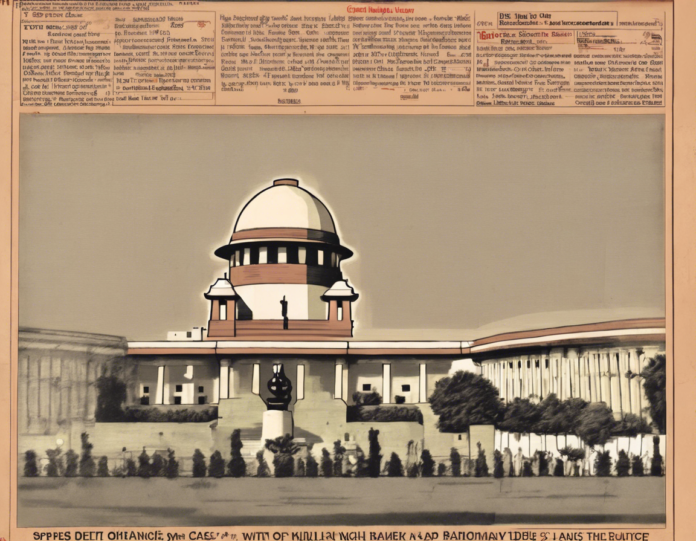Introduction
In recent years, the Indian legal landscape has witnessed several significant cases that have raised important questions regarding the interpretation of laws and the limits of executive power. One such case that has garnered widespread attention is the Delhi Ordinance Case, which has sparked a debate on the separation of powers and the role of the judiciary in upholding the rule of law. In this article, we will take a closer look at the Supreme Court decisions in the Delhi Ordinance Case and analyze the implications of these rulings on the legal system in India.
Background of the Delhi Ordinance Case
The Delhi Ordinance Case pertains to the controversy surrounding the Government of National Capital Territory of Delhi (Amendment) Act, 2021, which seeks to amend the Government of National Capital Territory of Delhi Act, 1991. The key issue at the heart of the case is the interpretation of Article 239AA of the Indian Constitution, which deals with the special provisions relating to Delhi as a Union Territory with a Legislative Assembly.
Supreme Court Decisions
The Supreme Court of India, in its landmark judgment on the Delhi Ordinance Case, has reiterated the principles of federalism and the separation of powers enshrined in the Constitution. The Court upheld the primacy of the elected government of Delhi in matters of administration while also emphasizing the importance of constitutional morality and adherence to the rule of law.
In a unanimous verdict, the Supreme Court clarified that the Lieutenant Governor of Delhi is bound by the aid and advice of the Council of Ministers and cannot act independently of the elected government except in matters of police, public order, and land. The Court also emphasized that the Lieutenant Governor is not required to concur on every decision taken by the Council of Ministers and that the principle of collective responsibility of the Cabinet is central to the functioning of the government in Delhi.
Implications of the Supreme Court Rulings
The Supreme Court’s decisions in the Delhi Ordinance Case have far-reaching implications for the governance structure in Delhi and the relationship between the elected government and the Lieutenant Governor. By reaffirming the constitutional scheme and the principles of federalism, the Court has clarified the respective roles and responsibilities of the executive and the legislature in Delhi, thereby ensuring a harmonious functioning of the democratic process.
Moreover, the Supreme Court’s emphasis on upholding constitutional morality and the rule of law is a significant development that underscores the importance of adherence to constitutional values and norms in the exercise of political power. The Court’s rulings in the Delhi Ordinance Case serve as a reminder to all stakeholders of the need to respect the constitutional principles that form the bedrock of India’s democratic system.
Conclusion
The Delhi Ordinance Case has been a watershed moment in the legal history of India, with the Supreme Court’s decisions setting important precedents for the interpretation of laws and the functioning of the government in Delhi. By reaffirming the principles of federalism, the separation of powers, and the rule of law, the Court has upheld the sanctity of the Constitution and the democratic ethos of the country. As we reflect on the implications of the Supreme Court’s rulings in the Delhi Ordinance Case, it is clear that these judgments will have a lasting impact on the legal and political landscape of India.
Frequently Asked Questions (FAQs)
1. What was the key issue in the Delhi Ordinance Case?
The key issue in the Delhi Ordinance Case was the interpretation of Article 239AA of the Indian Constitution, which deals with the special provisions relating to Delhi as a Union Territory with a Legislative Assembly.
2. What were the Supreme Court’s rulings in the Delhi Ordinance Case?
The Supreme Court ruled that the Lieutenant Governor of Delhi is bound by the aid and advice of the Council of Ministers and cannot act independently except in matters of police, public order, and land.
3. What are the implications of the Supreme Court’s decisions in the Delhi Ordinance Case?
The Supreme Court’s decisions have clarified the respective roles of the elected government and the Lieutenant Governor in Delhi, reaffirming the principles of federalism and the separation of powers.
4. Why are the principles of constitutional morality and the rule of law important in the Delhi Ordinance Case?
The Supreme Court emphasized the importance of constitutional morality and the rule of law to ensure adherence to constitutional values and norms in the exercise of political power.
5. How will the Supreme Court’s rulings in the Delhi Ordinance Case impact governance in Delhi?
The rulings will have implications for the governance structure in Delhi, ensuring a harmonious functioning of the democratic process by clarifying the roles and responsibilities of the executive and the legislature.









